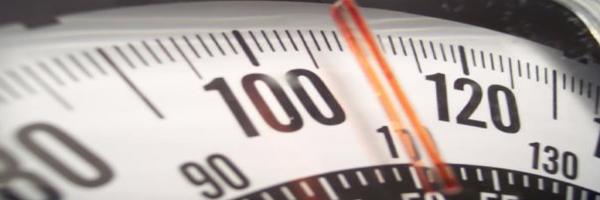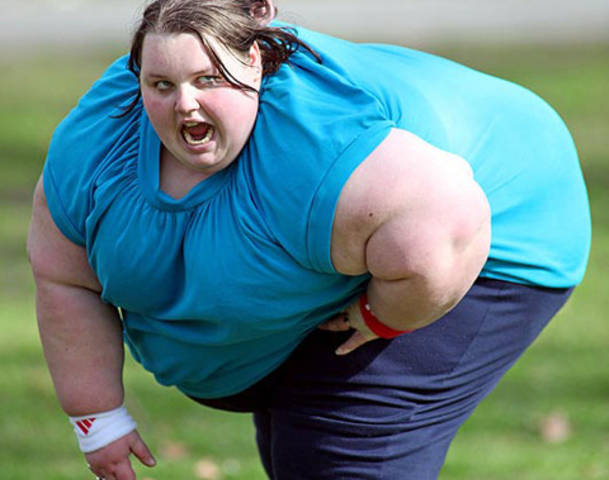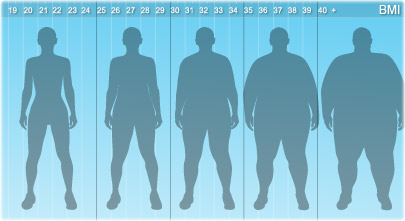The modern world is a complicated and confusing place.
Americans seem to have reacted to that confusion by becoming bigger themselves. In the past two years I’ve seen my own weight climb steadily until it reached 190 pounds on my 5’6″ frame – at which point I realized that there was an ISSUE here.
My weight was an issue that couldn’t be ignored or rationalized away any longer. I’ve whittled myself down to a more normal 164, but I’m still a big woman, and have a ways to go before I hit a healthy BMI (body mass index) of roughly 150 pounds, which puts me in a healthy weight range for my height.
My ballooning weight is far from abnormal in today’s world.
Cable television has filled many time slots with shows on the morbidly obese. Having spent three days in bed recovering from the flu I’ve had ample opportunity to watch shows on the “Half Ton Man…Woman…and Teen” and seen “Big Medicine,” along with a slew of other shows devoted to the morbidly obese.
The primary question that springs to mind is how can people afford to be so heavy?
Especially the people who manage to reach 500 plus pounds? Many of these shows feature people who are unemployed and bed ridden. So how do they get the vast quantities of food needed to stuff their over-stuffed bodies?
The obvious answer is that for every morbidly obese person there is one or more enablers who are willing to purchase food, in most cases prepare it, and feed their loved ones to death. It’s obvious from these programs that most of these people abhor their hefty hindquarters.
It’s also apparent that the mothers (yep it usually seems to be the mamas) live in fear of their pudgy progeny dying. And that is a very real possibility.
The morbidly obese are more prone to heart attacks and diabetes along with any number of health concerns. TLC’s “Half Ton Woman” died from obesity related complications on cable TV, which is not your average end to daytime programming. Being fat literally killed her.
So what’s the deal? If I can hit 190 and think – wow – this is unacceptable.
I’m one chubby monkey and have to do something NOW, why can’t everyone?
To put this question into perspective an 800 pound person’s life expectancy is zero. They could literally keel over dead at any moment. As far as I know even heroine junky alcoholic crack heads have a better life expectancy than that.
The striking thing about many of the people on the cable programs is that they generally have one or more obese parent and so the child’s weight gain may at first be considered less concerning than if the child were born into a family where people maintained a healthy weight.
My own father was obese for long periods of time. My own weight inched higher in conjunction with the weight of my sisters. We were skinny together…and grew increasingly chunky together. It’s much less disconcerting eating fries and burgers when everyone else is eating that way as well.
One recent article also suggested that obesity and poverty go hand in hand. T
he poor do have less access to high quality or organic food, but while recent studies have found that a calorie is a calorie is a calorie. Six hundred calories from McDonald’s – and six hundred calories from a well balanced meal still equals the same amount of weight. Of course a healthy meal has a myriad of other benefits, but as far as weight gain a calorie is a calorie.
The average American woman can maintain her current weight eating 2,000 calories a day.
The average American man can eat 2,500 without gaining weight. McDonald’s may be the obvious choice in a poor neighborhood, but that doesn’t mean it needs to make you fat.
A cheeseburger, soda, and a small fry at McDonald’s is 550 calories. A breakfast of three eggs, two slices of bacon, and toast is roughly 500.
Adinner of spaghetti with meat sauce is roughly 280 calories per serving – have two and that’s still only 560 calories. This leaves 390 calories for a glass of milk, a soda, or a reasonable snack.
Eating less food, even if it’s unhealthy food, may not do much for your cholesterol, but it will save a person from a whole slew of other health problems. Figure out what a portion of food really is – eat crap if you must – just don’t supersize it.
Big box stores like Walmart do offer fruits and vegetables – and even the small corner markets have canned fruits and vegetables if fresh aren’t available. Frozen fruits and vegetables are a great alternative since they don’t usually add sodium and will last months if necessary. Being poor doesn’t mean being stupid – and it doesn’t mean being either.
Given the high cost of obesity we should be looking at how to deal with it as a society.
Obesity clearly negatively impacts the health of our children and in many cases it can impact their academic progress.
In schools obesity should be treated with the seriousness given to any other addictions students may have.
And frankly – perhaps enabling your minor child to become obese should be looked at like any other form of child abuse – necessitating state intervention and counseling for both parent and child.
HMO’s and Employers and the government should be allowed to intervene if an employee or a HMO participant tops 300 pounds – offering counseling, nutritional interventions, and surgery if necessary before weight gets to the point where it’s endangering the health of the patient – and most likely the health of patients’ family, as well.
The morbidly obese cost us all money in disability payments and raised health care costs. Obesity, like crime, is everyone’s problem and our society should have better tools for dealing with it.
I wish my peer group had come to me somewhere around 170 pounds and said, “Look – this is not a road you want to travel. Here are some options, let me help.”
The good news is that healthy eating is just as contagious as bad habits. When I began to change my eating habits my obese father followed suit.
Healthier and happier he was also able to cut his blood pressure medication in half. My sisters have slimmed down and now fall within a normal weight range.
My sister’s family are watching their habits more closely in order to impact the slight chunkiness of my 11 year old niece, before her weight gets out of hand. Now when I meet my family members they are likely to suggest going for a walk or hike – instead of meeting over a meal.
If we start making changes, instead of excuses, there is a much healthier light at the end of our big fat tunnel.







